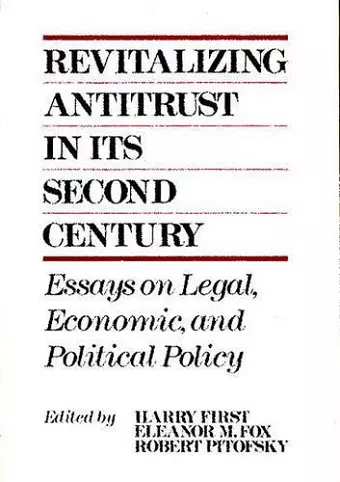Revitalizing Antitrust in its Second Century
Essays on Legal, Economic, and Political Policy
Harry First editor Eleanor M Fox editor Robert Pitofsky editor
Format:Hardback
Publisher:Bloomsbury Publishing PLC
Published:23rd Oct '91
Currently unavailable, and unfortunately no date known when it will be back

In this provocative new work, a distinguished group of policymakers, legal scholars, and economists challenge the prevailing view that antitrust legislation is no longer relevant, arguing instead that antitrust, progressively construed and adapted to today's economic realties, remains the most promising national economic policy for this country.
These essays challenge the prevailing view that antitrust legislation is no longer relevant and argue instead that antitrust, progressively construed and adapted to today's economic realities, remains the most promising national economic policy for the USA.
America has entered its second century of antitrust law. The United States has come through the 1980s of laissez faire when antitrust had its lowest profile since the Hoover days, lawyers advised clients that anything goes, and theorists justified non-enforcement of the law by Chicago School economics--the claim that antitrust exists only to create efficiency and that business freedom creates efficiency. Meanwhile, the European Community has a developing body of antitrust law. It rejects the Chicago School as ignoring market realities, and it incorporates into its law values of opportunity, access, open markets and the right to be free from exploitation. The newly democratized European nations and Russia all have moved to market economies and adopted antitrust law in the image of the European Community, in spite of the carpet baggers trying to sell laissez faire. The Supreme Court of the United States has now reversed the swing of the U.S. antitrust pendulum, rejecting Chicago School theory in favor of market reality and accepting the fact that there is an antitrust right not to be coerced and abused by market power.
What is the intellectual foundation of this new antitrust--this law that respects efficiency, progressiveness, access, and freedom from abuse of power, and which reflects the need of business firms to be active and agile players in a global marketplace? That foundation is contained in Revitalizing Antitrust in its Second Century. This is the only book that provides the underpinnings for the new antitrust. It is the only book that helps the scholar/lawyer/business advisor/student understand the direction of antitrust and how to predict the course of the law. Four of the authors in the book were cited by the Supreme Court in its June opinion; one was cited eleven times. Revitalizing Antitrust in its Second Century is an indispensable volume for lawyers, economists, business advisors, sholars and students of law, economics, business and political economy.
ISBN: 9780899304397
Dimensions: unknown
Weight: unknown
568 pages